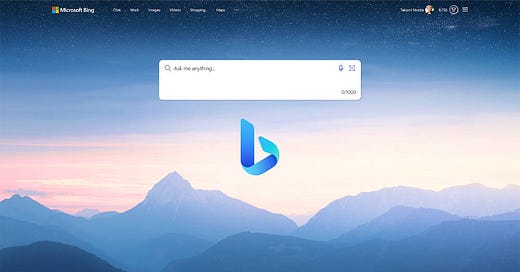Microsoft announces new Bing search engine powered by AI
Bing now wields the power of robotic minds
Hot on the heels of Google’s plan to integrate AI with search, Microsoft has revealed a new AI-powered version of Bing that incorporates the same language model used by viral AI chatbot ChatGPT.
As before, users can use Bing to search for a question, but as well as being shown a list of links to relevant web pages, they’ll now also be given a short AI-generated answer in a right-hand sidebar.
➡️ The Shortcut Skinny: AI-powered Bing
🆕 Microsoft has unveiled a new version of Bing
🌐 The search engine now includes AI functionality
😊 It’s been rolled out in a limited form, with a full version coming soon
💪 Search queries will automatically generate concise answers
In another mode that’s not yet accessible, you’ll be able to talk directly to the AI model in a chat window, much like how ChatGPT currently operates.
The new Bing search engine is live now, although only with a limited number of AI searches for each person. Head over to Bing.com and try one of the suggested questions to see how the new search feature works.
It looks pretty powerful. When asked for trip recommendations that are within a three-hour flight from London, it serves up several suggestions, explains the highlights of each, and even suggests a few day trips you might be interested in. You can then select from a range of preset follow-up questions to continue the conversation for more details.
However, it isn’t yet possible to search your own, original questions using the new feature. Microsoft will open up full access soon and has already rolled out a waitlist you can sign up for on the Bing homepage. As well as opening up the AI-powered search engine, it will also grant access to the chat version, which removes the list of web page links altogether and looks more like a traditional chatbot.
“AI will fundamentally change every software category, starting with the largest category of all – search,” Microsoft CEO Satya Nadella said in an announcement post. And he doesn’t look wrong. This is a big change to the basic search engine model that remained all but static for the last twenty years.
Microsoft seems keenly aware of what’s on the horizon and has likely launched this half-completed AI service to get in front of Google, which just this week announced it’s working on its own AI language model to rival ChatGPT.
Prior to that, it announced a multi-billion dollar investment in OpenAI, the research company behind ChatGPT, and a host of new AI-powered functions that are coming to Microsoft Teams.
Hopefully, the new Bing functions improve the user experience of search engines, which are so often clogged with repetitive, inexpert information. The challenge, and one that developers will still need to clear, is whether AI-assisted search can do any better.







